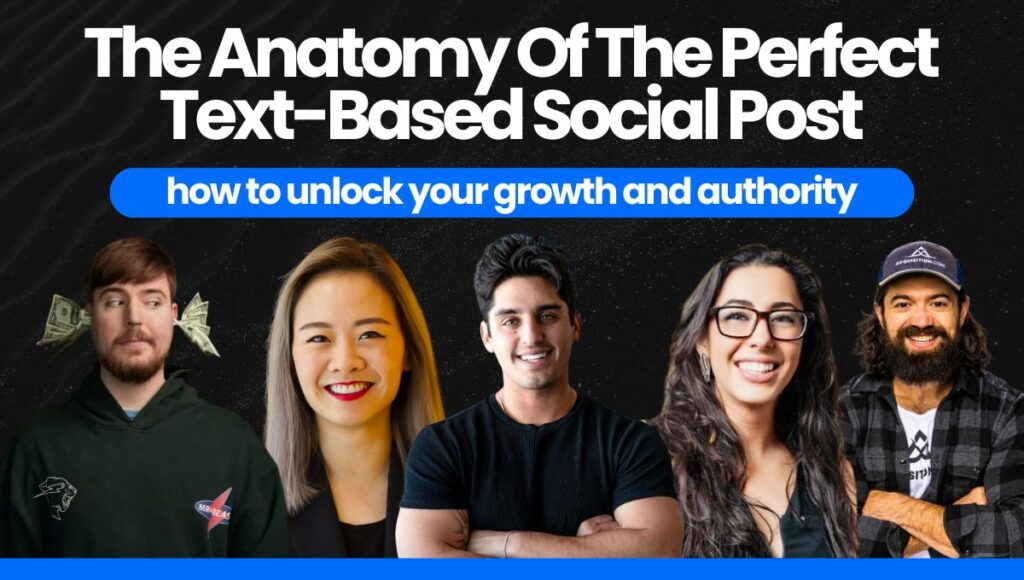The anatomy of the perfect social media post and the perfect text-based social post are very similar.
You need to understand how to:
- Hook Your Audience
- Build A Curiosity Gap
- Leverage Familiarity
- Evoke Emotion
- Brevity and Formatting
- Provide Tons of Value
Among a slew of other things we will be covering to level up your social strategy.
It might seem like a lot to know for a simple post on social media but remember:
- These social posts are the fuel to our newsletter engines: We need organic growth, to grow our newsletter. Then our newsletter can build more trust and authority, earn the majority of our revenue and even flywheel back to social for more growth.
- You don't have to use ALL of these elements for each post: You will learn to leverage each of the elements above, and more, but they're not necessary every time you want to craft a perfect post. Sometimes it only takes 2-3 of these to get the job done.
- These elements will become second nature to you: You're always learning, but once you know these elements, iteration becomes natural. It's all about the reps.
In order to get you started with your first reps, I'll be taking a look at creators like:
- Wes Kao
- Mr. Beast
- Alex Garcia
- Alex Hormozi
- Katelyn Bourgoin
Let's start with the fact that we're actually talking about long form text-based posts.
What you learn here will apply to ALL types of posts, but I'm going to be putting emphasis on long-form as we make our way through.
These are what I call SuperThreads on Threads, or what would simply be referred to as a thread on Twitter or Bluesky.
And there's no better way to get started than talk about Alex Garcia...
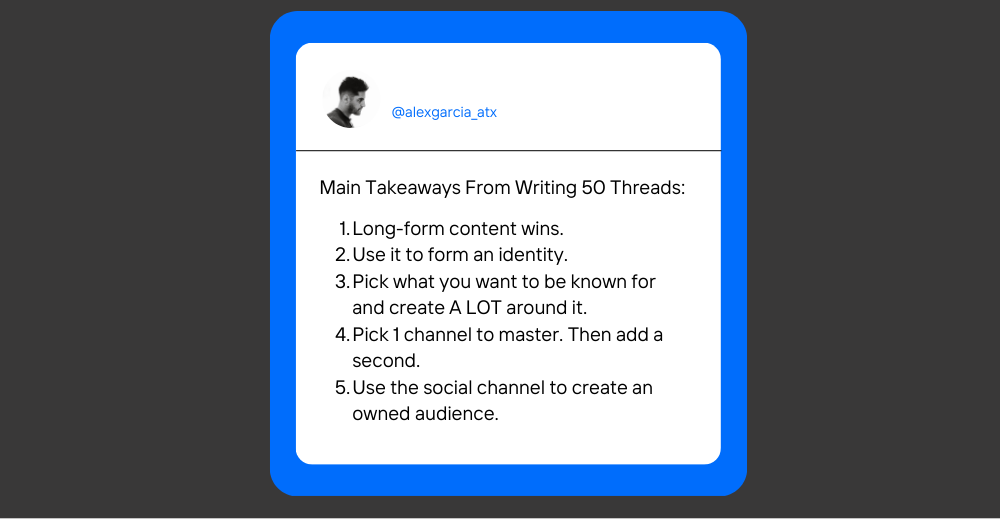
 50 Threads In 50 Days
50 Threads In 50 Days
In 2021 Alex Garcia challenged himself to write 50 Threads In 50 Day.
The challenge consisted of him needing to write a threaded-post on Twitter every day for 50 days that pertained specifically to growth marketing.
Alex had set out to become "The Marketing Guy", and his 50 threads were the first step he was taking to own his new category.
Reminder: What the heck is a "thread"?
A thread on Twitter and Bluesky: is a long-form post that consists of multiple posts being "threaded" together. This is done by writing a post and then adding posts below the original post, stringing more onto the main topic.
A thread on Threads: is often just thought of as a singular post.
Some people call long-form threads [on Threads] a "threaded-thread", but I typically refer to them as SuperThreads.
In the Tweet shown in the image above Alex shares that his main takeaways from writing 50 threads were:
- Long-form content wins.
- Use it to form an identity.
- Pick what you want to be known for and create A LOT around it.
- Pick 1 channel to master. Then add a second.
- Use the social channel to create an owned audience.
As you can tell, Alex completed his 50 day Thread challenge and it completely changed the trajectory of his business (and life).
With these 50 threads he began growing what is now an 8-figure newsletter called Marketing Examined.
In his 50 Day Thread Challenge Alex:
- Went from 500 followers to 40,000 followers.
- Went from 0 email subscribers to 9,000 subscribers.
- Began building his category as "The Marketing Guy."
Yes, you read that right.
Like Alex, many other creators in the past have used long form text-based content to explode their growth, build authority and create an owned audience (email list).
And while Twitter growth has absolutely plummeted, with some creators losing more than 80-90% of their earnings due to lack of reach, Threads has come in as a great replacement, with generous amounts of reach and engagement, even for smaller creators.
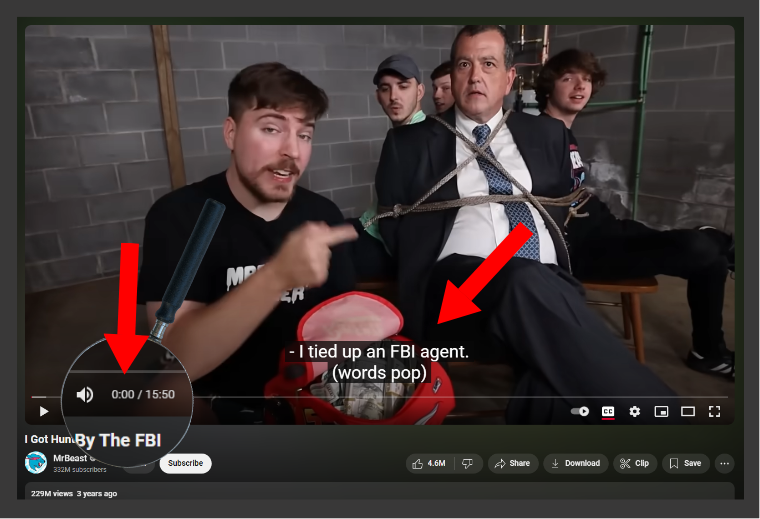
 Hook -> Curiosity Gap
Hook -> Curiosity Gap
An entire book can be written on hooks.
And I'm sure there have been plenty.
But instead of attempting to teach you the art of writing hooks in one small section, I'm going to instead tell you what a hook is (just in case...), how to use it to build your curiosity gap, and then layer on this lesson throughout the rest of this deep dive.

A hook is what we use to grab attention.
If you watch any Mr. Beast video you'll notice that within a few seconds he has grabbed your attention by invoking some kind of emotion.
He may intrigue you, shock you, excite you, or even scare you.
And the same goes for text-based content.
The first line of a post (and often first short post of a Threads post) is your hook.
You need to grab your readers attention and get them to stop scrolling.

It doesn't matter if you write the best post on the entire internet....
If you fail to hook your reader, your post will flop.
But, at the same time, your hook is virtually useless if you don't build curiosity and keep your reader engaged and wanting more.
Which is where curiosity gap comes in.


In the image I shared above you can see a Mr. Beast video titled "I Got Hunted By The FBI".
Not even ONE SECOND into the video Mr. Beast says "I tied up an FBI agent."
The Hook.
He then says: "If he steals this $100,000 from me before midnight he keeps it."
Curiosity Gap.
It's like when they start a Law & Order episode by showing us a murder. They shock us, and build curiosity gap. We're hooked and have to keep watching.
And Mr. Beast is a master of it.
And as we continue we'll be taking a look at some other examples and how they do it for text-based social posts.
SuperThread Example: Here's an example of how hooked attention and quickly built curiosity gap with one line.
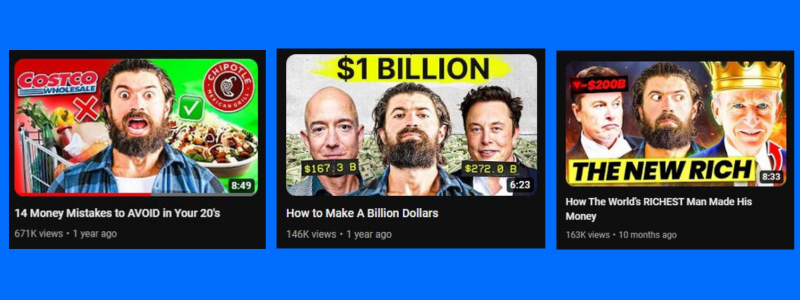
 Leveraging Familiarity
Leveraging Familiarity
We've seen how creators borrow authority to build their own, but leveraging familiarity is specifically a way to grab attention, and it's so powerful even the world's largest creators like Alex Hormozi still do it.
If you take a look at the image above you can see some of Hormozi's past YouTube videos and how he leverages the familiarity of:
- Costco
- Chipotle
- Jeff Bezos
- Elon Musk
They're still relevant to the topic, but they're mainly there to stop our scroll and get a click.
From there it will be his job to actually hook his audience within the first three seconds of the video.
You can do the same thing with your text-based posts:
- Leverage familiarity to stop the scroll.
- Hook them within your first few lines.
- Build curiosity gap and keep them engaged.
SuperThread Example: Here's an example of how I leverage Dan Koe's familiarity, hook my reader and then build curiosity to keep them engaged throughout my whole post.
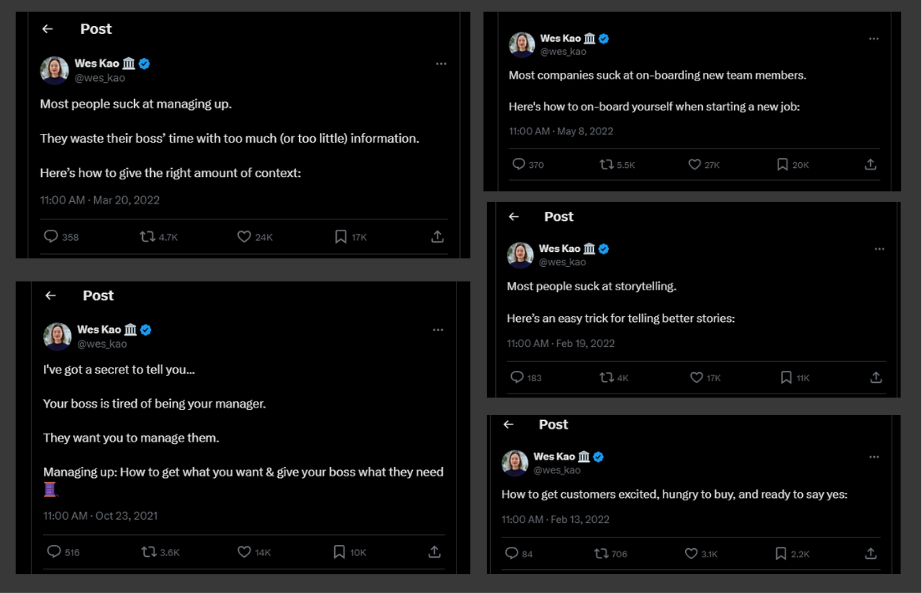
 Evoking Emotion
Evoking Emotion
There are 6 basic emotions.
- Happiness
- Sadness
- Fear
- Anger
- Surprise
- Disgust
And if we expand on that we can name another 21.
That's a total of 27 emotions for anyone keeping count.
It's our job to evoke one of these emotions from our reader when we're writing our text-based posts.
If we read some of Wes Kao's posts above we can tell she used the almost identical hook for 3 of her viral posts, evoking fear each time:
- "Most companies suck at onboarding new team members."
- "Most people suck at managing up."
- "Most people suck at storytelling."
If we fit into the "most people" category she's referring to, we don't want to suck.
We're worried we may be one of the people who suck.
So we keep reading to make sure we're not.
Let's take a look at another one:
- "I've got a secret to tell you..."
In this one she evokes curiosity right away, and then pokes it in the very next line.
"Your boss is tired of being your manager."
Now we have to keep reading to see what she means (and why our boss is tired of it)!
Okay last one:
- "How to get customers excited, hungry to buy, and ready to say yes:"
Here's a one liner that immediate evokes curiosity.
So while we have 27 emotions we can evoke to immediately hook our reader, we can also skip right to curiosity and start building our gap.
SuperThread Example: Here's an example of how I used fear with my one line hook to capture my reader's attention and then immediately built on curiosity gap.
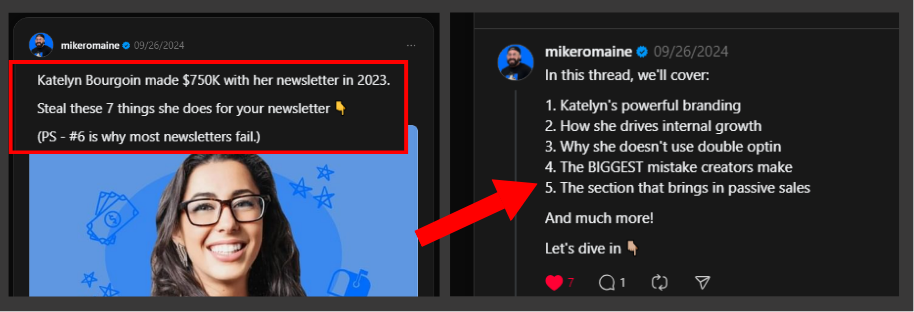
 Keep Them Engaged
Keep Them Engaged
If you watch a Mr. Beast video you'll notice that he keeps reminding you of the reason you're watching.
For example, in the case of the FBI agent needing to catch him to win $100,000, Mr. Beast continuously teases and questions whether or not the agent will actually be able to do it, and reiterates what's at stake.
Constantly keeping us engaged and needing to stick around until the end.
It's masterful storytelling.
If you hook your reader but then give away the hook and curiosity you build immediately, there's no reason for anyone to keep reading.
So, instead, you need to continue building on or poking at that curiosity (or even creating more) in order to get them to stick around.


While consistently nudging the curiosity you've built is a great way to keep your audience reading and engaged, you can also consider giving them extra layers of curiosity gap right when you hook them.
In the SuperThread above you can see I broke down Katelyn Bourgoin's newsletter.
I hook you with her achievements and get you curious and wanting to know the 7 thing she does that you can steal for your own.
But then I immediately give you a reason to stick around AT LEAST to #6 by adding in a fear re-hook and new layer of a curiosity gap with "PS - #6 is why most newsletters fail."
Note: If you're going to use a re-hook like this PLEASE deliver the value you're promising.
In the image to the right you can see my table of contents post that I added directly under my initial thread.
In this post I'm poking the fear and layering on the curiosity GAPS I have built:
In this thread, we'll cover:
1. Katelyn's powerful branding
2. How she drives internal growth
3. Why she doesn't use double optin
4. The BIGGEST mistake creators make
5. The section that brings in passive sales
And much more!
Let's dive in
I make you want to know MORE, without giving anything away and ruining the curiosity gap built with my hook & re-hook.
SuperThread Example: You can read the full example of my teardown of Katelyn Bourgoin's newsletter here.
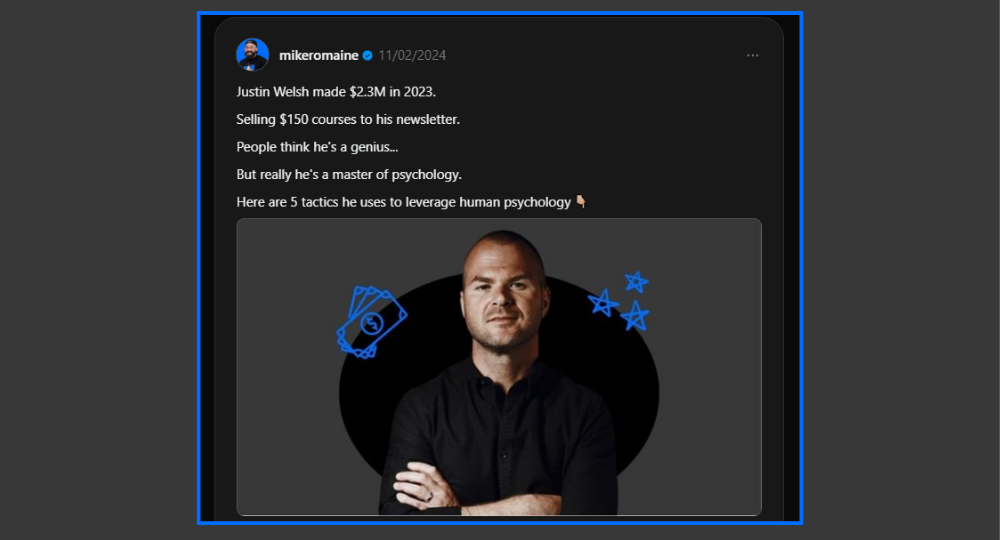
 Make It Easy To Read: Brevity & Formatting
Make It Easy To Read: Brevity & Formatting
Long form is king.
It wins us followers and subscribers, builds authority, and allows us to start claiming our brand identity when we write around a specific niche category.
But that doesn't mean people like staring down a massive paragraph while scrolling on social media.
They don't.
It makes them want to keep scrolling.
So, while I won't be going into too much depth in this section, I did want to take a look at an example of how formatting, white space and brevity can be powerful.
If we read the post in the image above it looks like this:
Justin Welsh made $2.3M in 2023.
Selling $150 courses to his newsletter.
People think he's a genius...
But really he's a master of psychology.
Here are 5 tactics he uses to leverage human psychology
Formatting to make it easy to read with plenty of white space.
As opposed to what it could have looked like if I didn't format specifically for social media:
Justin Welsh made $2.3M in 2023 by selling $150 courses to the people on his newsletter and people think he's a genius, but really he's a master of psychology.
Here are 5 tactics he uses to leverage human psychology...
Can you spot the difference?
Formatting matters.
Start paying attention to the formatting of the top creators, leaving more white space, and making it easier for your audience to scan your posts before deciding if they want to continue reading more.
Timeout: The perfect social post is also going to include a CTA. And we already have an entire deep dive on the best CTAs to grow your newsletter organically.
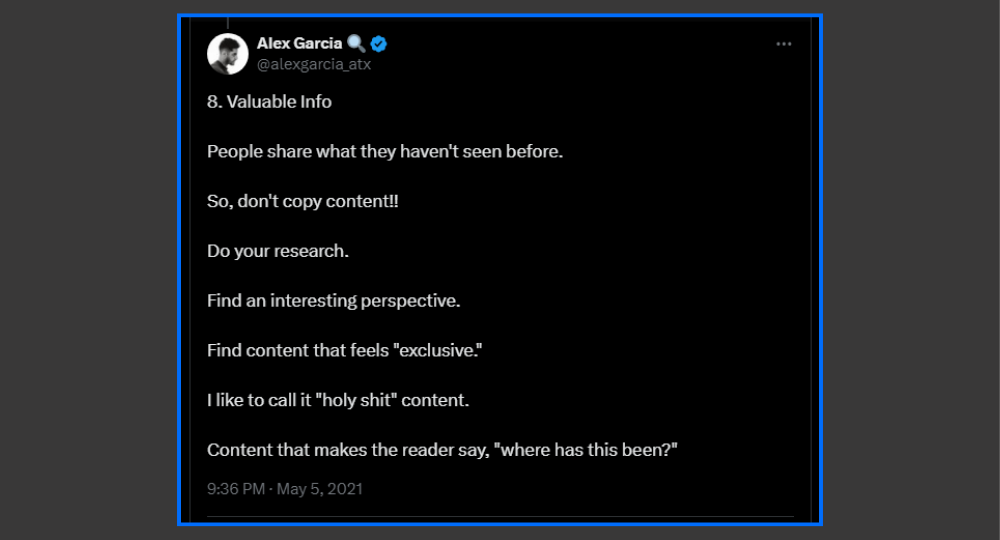
 The Final Piece: Value
The Final Piece: Value
As I mentioned above: if you're going to hook, re-hook and build curiosity, you NEED to deliver on the promises you're making.
If not, that's when you find yourself in the realm of clickbait and begin losing trust.
In the image above I'm sharing a post from Alex Garcia's thread breaking down the 15 things he learned from writing 50 days of threads.
I want you to read it, then read it again:
Valuable Info
People share what they haven't seen before.
So, don't copy content!!
Do your research.
Find an interesting perspective.
Find content that feels "exclusive."
I like to call it "holy shit" content.
Content that makes the reader say, "where has this been?"
Oh, and I just have one more comment to add to this...

Take notes.

Get in the reps.
Start getting the reps in now and practices different hooks, re-hooks and building curiosity.
Remember all the things we went through in this deep dive, but also remember that you are definitely going to miss sometimes.
Sometimes I have a post go viral and I repost it 3-months later with a different hook test and it completely flops.
Just keep testing and practicing.

